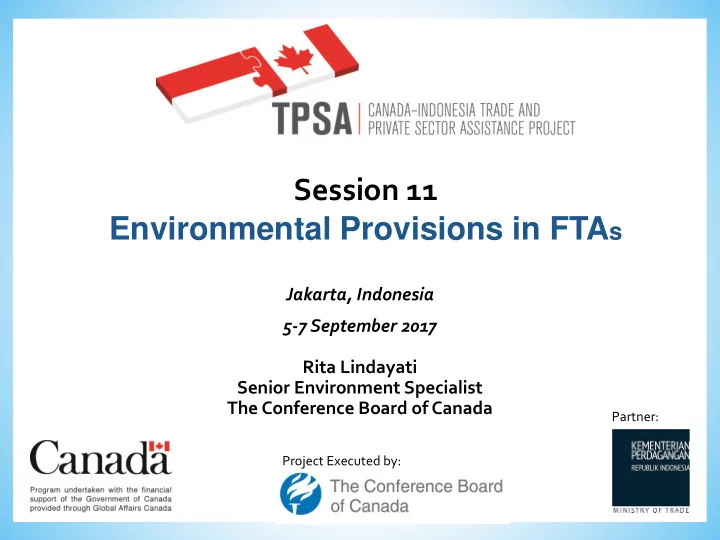

Session 11 Environmental Provisions in FTA s Jakarta, Indonesia 5-7 September 2017 Rita Lindayati Senior Environment Specialist The Conference Board of Canada Partner: Project Executed by:
Overview • Background: Pros and Cons of FTA Environmental Impacts • Environmental Provisions in Free Trade Agreements: Historical Trends • Main Types of Environmental Provisions • Common Objectives of Environmental Provisions • Example from Canada • Concerns of Developing Countries • Some Considerations for Indonesia in Negotiating FTA Environmental Provisions
Pros and Cons of FTA Environmental Impacts Pros: - More resources for environmental protection as FTAs are bad FTAs are increased trade boosts economic growth for the good for the - Better access to cleaner technology and environment! environment! environmental goods and services - Encourage technical innovation and more efficient allocation of resources - Improved environmental standards (especially to meet the requirements from the developed markets) Cons: - Increased trade could deplete natural resources and worsen pollution - Weak environmental standards and law enforcement in many developing countries would Source: picture from the internet attract polluting industries
Factors Affecting FTA Environmental Impacts Scale Environ- Structure mental FTAs impacts: • Sector/product Land • Water • Air Technology • Flora & fauna • Human Environmental policies/ health regulations • Etc.
FTA Environmental Provisions: Historical Trends Global Environmental Events • GATT General Exceptions Articles XX (b) and (g) • Groups on Environmental Measures and International Trade/ EMIT (dormant) GATT • Sanitary and Phytosanitary (SPS) Measures - 1972 UN Conference on the Human Environment • Technical Barriers on Trade (TBT) (1947) • Subsidies and Countervailing Measures (SCM) (Stockholm Conference) • Trade-Related Aspects of Intellectual Property Rights (TRIPS) - 1987 Brundtland Report • General Agreement on Trade in Services (GATS) - 1992 Rio Earth Summit (Agenda 21) • Agreement on Agriculture (AoA) - 2002 World Summit On Sustainable Development • Preamble of Marrakesh Agreement: Sustainable Development Objective • GATT General Exceptions Articles XX (b) and (g) WTO • SPS, TBT, SCM, TRIPS, GATS, AoA • Established the Committee on Trade and Environment (CTE) to advice General Council on Trade-Environment (1995) linkage • Established Committee on Trade and Environment Special Sessions (CTESS) focusing on trade-environment negotiations: e.g., link between WTO & Multilateral Environmental Agreements (MEAs), fisheries subsidies, removing trade barriers on environmental goods and services • Preamble NAFTA • Environmental provisions in the main text • Environmental Side Agreement (North American Agreement on Environmental Cooperation/NAAEC) (1994) • Established institution and resources to implement the agreement (Commission on Environmental Cooperation) • The first most comprehensive FTA environmental provisions
GATT Article XX: General Exceptions Subject to the requirement that such measures are not applied in a • manner which would constitute a means of arbitrary or unjustifiable discrimination between countries where the same conditions prevail, or a disguised restriction on international trade, nothing in this Agreement shall be construed to prevent the adoption or enforcement by any contracting party of measures: (b) necessary to protect human, animal or plant life or health; (g) relating to the conservation of exhaustible natural resources if such measures are made effective in conjunction with restrictions on domestic production or consumption;
Free Trade Agreements With and Without Environmental Provisions post-NAFTA Source: Colyer, 2013
Common Objectives of Environmental Provisions in FTAs • Promoting sustainable development and attaining high levels of environmental protection • Levelling the playing field and improving environmental cooperation • Pursuing an international environmental agenda in a more efficient and rapid way through trade agreements
Main Types of FTA Environmental Provisions Protection and improvement of the environment through maintaining, • enhancing, and enforcing environmental laws and regulations (e.g., national/ bilateral/regional/multilateral environmental laws) Cooperation in environmental activities and projects including • improving and enforcing laws Public involvement in environmental activities related to trade and • the environment Institutional mechanisms for the implementation of trade-environment • related activities/projects and dispute resolution Source: Coyler,
Spectrum of FTA Environmental Objectives Most Least In between ambitious ambitious
www.TRENDanalytics.info
Canada Experience • Environment is an integral part of majority Canada’s FTAs • Canadian government conducts Environmental Assessment of FTAs as a part of negotiation process • Legal framework: the Cabinet Directive on the Environmental Assessment of Policy, Plan and Program Proposals • The Framework for Conducting Environmental Assessments of Trade Negotiations outlines the process and analytical requirements for conducting the assessment. It focuses on the identification of the potential environmental impacts of an initiative. • The key objective of environmental assessment is to assist Canadian negotiators to integrate environmental considerations into the negotiating process by providing information on the environmental impacts of the proposed trade agreement.
Concerns of Developing Countries in Adopting Environmental Provisions • Domestic environmental management system is still in its infancy (vis a vis the trading partners) • Environmental provisions will become trade barriers • Implementation will be excessive burden on human and financial resources • Lack of political will/ opposition from higher level of government • Lack of capacity in negotiating environmental issues • Insufficient coordination between trade and environment ministries
Some considerations for negotiating environment related provisions in FTAs for Indonesia • The nature of legal obligations emerging from provisions relating to the environment under a FTA; • The potential economic costs of specific environmental requirements; • Areas where technical assistance and capacity building would be necessary to ensure compliance with environmental obligations; • The nature and extent of financial assistance required; and • The nature of dispute settlement and enforcement mechanisms .
THANK YOU!!
Recommend
More recommend